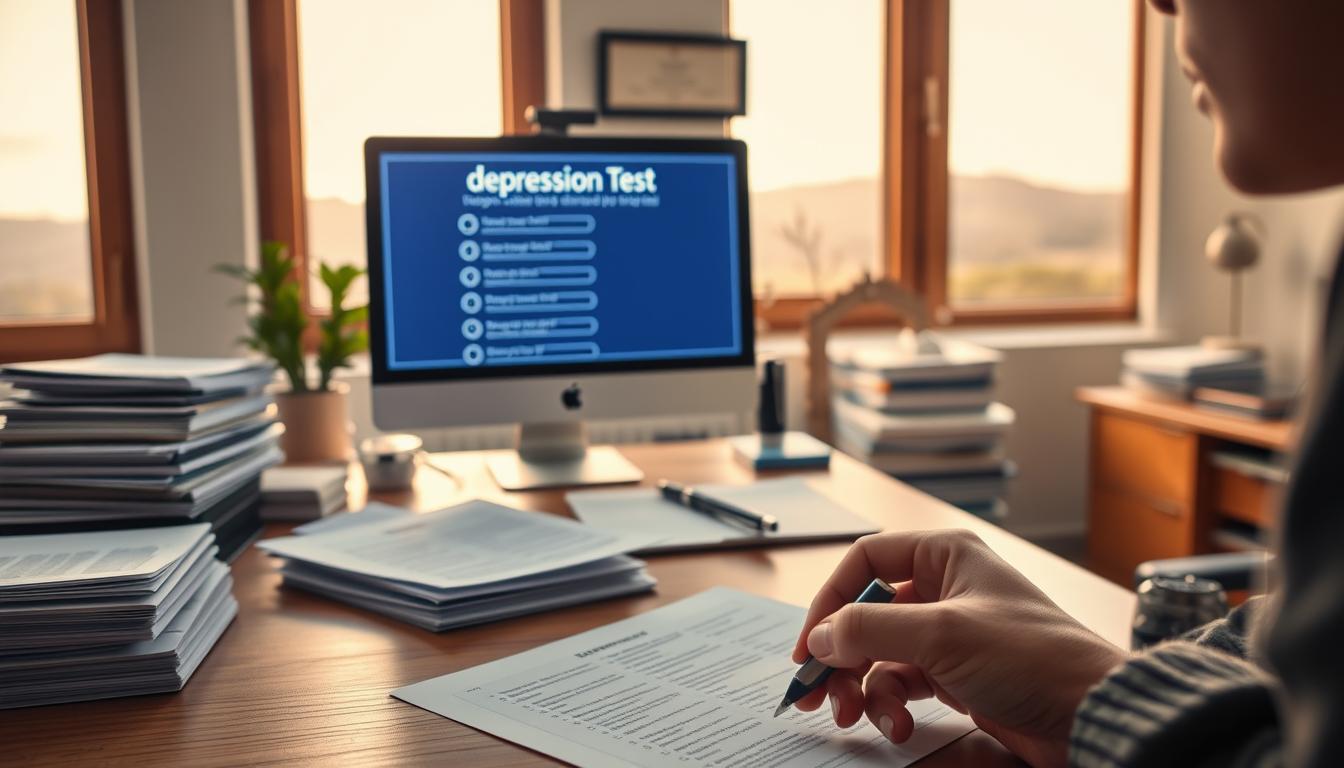I am a participant in the Amazon Services LLC Associates Program, an affiliate advertising program designed to provide a means for sites to earn advertising fees by advertising and linking to Amazon.com and affiliated sites. This post contains affiliate links. Privacy Policy
Do I Have Depression? Get the Facts
Are you feeling sad or hopeless for more than just a day or week? You’re not alone. Many people find it hard to understand their feelings and spot signs of a bigger problem.

Understanding your mental health is key in today’s world. If you’re thinking, “Am I depressed?,” you’re on the right path. You’re taking the first step towards getting help and finding out what’s going on.
Best brain supplement!
Key Takeaways
- Learn the common signs and symptoms of depression
- Discover how a depression quiz can help you understand your mental health
- Understand the importance of seeking professional help
- Explore the different types of depression tests available
- Find out how to take a depression quiz and what to expect from the results
Understanding Depression: More Than Just Feeling Sad
Depression is more than just feeling sad. It’s a complex mental health issue that affects millions globally.
What Is Clinical Depression?
Clinical depression, or major depressive disorder, is a serious condition. It brings persistent sadness, hopelessness, and a lack of interest in activities you once enjoyed. It’s not just a bad day or week; it lasts longer and affects your daily life.
Depression vs. Normal Sadness
Feeling sad or blue sometimes is normal. But depression is different. It’s a condition where these feelings are intense and last more than two weeks. You might notice depression symptoms like changes in appetite, sleep issues, and trouble concentrating.
Types of Depressive Disorders
There are several types of depressive disorders. These include persistent depressive disorder, postpartum depression, and seasonal affective disorder. Each type has its own clinical depression indicators. It’s important to recognize the signs of depression and understand the symptoms of depression to get the right help.
Common Signs and Symptoms of Depression
You might be experiencing depression if you notice certain emotional, physical, and behavioral changes. Depression is a complex condition that affects individuals differently. It’s crucial to understand its various symptoms.
Emotional Symptoms
Depression often shows through emotional symptoms like sadness, hopelessness, and guilt. You might feel overwhelmed by negative thoughts. Or, you might lose interest in activities you once enjoyed.
Physical Symptoms
Physical symptoms of depression include changes in appetite and sleep disturbances. You might struggle to sleep or sleep too much. Changes in appetite can also lead to weight loss or gain.
Cognitive Symptoms
Cognitive symptoms involve difficulties in concentration, memory, and decision-making. You might find it hard to focus on tasks or make decisions. This can be frustrating and affect your daily life.
Behavioral Changes
Depression can lead to noticeable behavioral changes. You might withdraw from social interactions or neglect responsibilities. You might also engage in risky behaviors.
Recognizing these signs and symptoms is the first step toward seeking help. If you’re experiencing several of these symptoms, it’s essential to consider reaching out to a mental health professional for support.
Do I Have Depression? Self-Assessment Tools
Figuring out if you have depression can be tough on your own. But, self-assessment tools can give you some clues. They’re not a full diagnosis, but they can help you understand your feelings better.
Popular Depression Screening Tests
There are many online tests for depression, like the Patient Health Questionnaire-9 (PHQ-9) and the Beck Depression Inventory (BDI). These tests ask about your mood, appetite, sleep, and more. They help figure out how you’re doing mentally.
| Test Name | Description | Length |
|---|---|---|
| PHQ-9 | A 9-item questionnaire assessing depression severity | 9 questions |
| BDI | A 21-item inventory measuring depression symptoms | 21 questions |
How to Use Self-Assessment Tools Properly
Be truthful when using these tools. They work best when you answer honestly and get a pro’s opinion too.
Limitations of Self-Diagnosis
Self-assessment tools are helpful, but they’re not enough. They can’t replace a real doctor’s diagnosis. Always talk to a mental health expert for a proper diagnosis and treatment.
If you’re worried about your mental health, get help. These tools are just the start. Professional advice is key to dealing with depression well.
Risk Factors for Developing Depression
Depression can come from many sources. This includes your biology, mind, and environment. Knowing these factors can help you stay mentally healthy.
Genetic and Biological Factors
Genetics are a big part of depression. If your family has depression, you might get it too. Also, problems with chemicals in your brain can make you feel sad.
Environmental Triggers
Things around you can also lead to depression. This includes big stress, trauma, or big changes in your life. Being alone and not having support can also make you feel down.
Psychological Vulnerabilities
Some mind traits can make you more likely to get depression. These include feeling bad about yourself, being anxious, or always seeing the worst. Long-term stress can also weaken your mind over time.
| Risk Factor | Description | Impact |
|---|---|---|
| Genetic Predisposition | Family history of depression | Increases likelihood |
| Environmental Triggers | Stressful life events, trauma | Can trigger depression |
| Psychological Vulnerabilities | Low self-esteem, anxiety | Increases susceptibility |
Understanding these risk factors helps you see your own chances. You can then take steps to lower your risk. This might mean getting help, making friends, or learning to handle stress.
How Depression Is Professionally Diagnosed
Wondering if you have depression? Getting a professional diagnosis is crucial. Depression is a complex condition that needs a detailed evaluation by a mental health expert.
The Diagnostic Process
The first step in diagnosing depression is a detailed medical history and physical check-up. This helps rule out other health issues that might cause your symptoms. Then, a mental health assessment follows. This includes a clinical interview, questionnaires, and psychological tests.
What to Expect During a Mental Health Assessment
At a mental health assessment, you’ll talk about your symptoms. This includes when they started, how long they’ve lasted, and how they impact your daily life. You’ll also discuss your feelings, thoughts, and behaviors. Plus, any big life events or stressors.
Medical Conditions That Can Mimic Depression
Some health issues can look like depression, making diagnosis tricky. For example, hypothyroidism, chronic fatigue syndrome, and certain neurological disorders can show similar symptoms. It’s important to have a thorough medical check-up to rule out these conditions.
As Dr. John Smith, a well-known psychiatrist, says,
“A comprehensive diagnosis is key for effective treatment. It’s not just about finding depression, but also understanding the person’s mental health as a whole.”
Treatment Options for Depression
Managing depression means trying different ways to feel better. This includes therapy, medication, and self-help. A mental health expert can help find what works best for you.
Therapy Approaches
Therapy is key in treating depression. It’s a place to talk about your feelings and learn how to cope. Cognitive Behavioral Therapy (CBT) is popular because it helps change negative thinking.
Cognitive Behavioral Therapy (CBT)
CBT looks at how your thoughts, feelings, and actions are connected. It helps you notice and change negative thoughts. This way, you can find better ways to deal with problems.
Other Evidence-Based Therapies
Other good therapies are Interpersonal Therapy (IPT) and Psychodynamic Therapy. They help you deal with deep issues and improve your relationships.
Medication Options
For some, medication is needed to manage depression. Antidepressants can help balance your mood. It’s important to work with your doctor to find the right medicine and amount.
Lifestyle Changes and Self-Help Strategies
Healthy lifestyle changes are also important. This includes regular exercise, mindfulness, and a consistent sleep schedule. These habits can help manage depression.
| Treatment Approach | Description | Benefits |
|---|---|---|
| Cognitive Behavioral Therapy (CBT) | Focuses on changing negative thought patterns | Develops coping strategies, improves mental resilience |
| Medication | Regulates mood through pharmaceuticals | Reduces symptoms, improves mood stability |
| Lifestyle Changes | Involves adopting healthy habits | Enhances overall well-being, supports mental health |
When and How to Seek Help for Depression
Recognizing the need for help is the first step in overcoming depression. It’s essential to know when to seek professional help if you’re experiencing symptoms.
Warning Signs That Require Immediate Attention
If you’re experiencing thoughts of self-harm or suicide, severe mood swings, or intense feelings of hopelessness, seek help immediately. These signs indicate a need for urgent support.
- Thoughts of self-harm or suicide
- Severe mood swings
- Intense feelings of hopelessness
Finding the Right Mental Health Professional
Finding the right mental health professional is crucial. Consider the following when selecting a professional:
- Qualifications and experience in treating depression
- Therapeutic approaches they use
- Personal rapport and comfort level
Overcoming Barriers to Getting Help
Common barriers to seeking help include stigma, cost, and lack of access to mental health services. To overcome these barriers, consider the following strategies:
- Educate yourself about depression and mental health
- Explore affordable treatment options
- Seek support from friends, family, or support groups
Conclusion: Taking the First Step Toward Healing
Understanding depression is the first step toward healing. You’ve learned that depression is more than just feeling sad. It’s a serious condition that needs professional help and support.
Seeking help for depression can be daunting, but it’s crucial. By recognizing the signs and symptoms, you can start getting the help you need. Coping with depression involves therapy, lifestyle changes, and self-help strategies.
If you’re struggling with depression, know you’re not alone. Depression help is available, and there are many resources to support you. By taking the first step and seeking help, you can begin your journey toward healing and recovery.
FAQ
What is the difference between depression and normal sadness?
Depression is a serious mental health issue. It makes you feel sad, hopeless, and not interested in things you used to enjoy. Normal sadness is a natural feeling when things are tough. It usually goes away with time.
How do I know if I have depression or just a bad day?
If you feel sad, hopeless, or don’t want to do anything for more than two weeks, you might have depression. A bad day is short and can get better with rest or a change in your situation.
Can I self-diagnose depression?
Online quizzes can give you an idea of your mental health. But, they’re not enough to say for sure if you have depression. A doctor or therapist needs to make the diagnosis.
What are the common signs and symptoms of depression?
Depression can make you feel sad and hopeless. It can also change how you eat, sleep, and think. You might pull back from friends and family too.
How is depression professionally diagnosed?
Doctors diagnose depression by talking to you, doing a physical check-up, and looking at your health history. This helps them understand what you’re going through.
What are the treatment options for depression?
There are many ways to treat depression. Therapy, like cognitive behavioral therapy (CBT), can help. So can medicine and making healthy lifestyle choices.
Can I overcome depression on my own?
Some people with mild depression might manage it by themselves. But, more serious cases need professional help. A therapist can offer the support and guidance you need.
How can I find the right mental health professional for my needs?
To find a good therapist, ask your doctor for recommendations. You can also check with your insurance or search online for licensed professionals in your area.
What are some common barriers to seeking help for depression?
Many people don’t get help because of fear or shame. Lack of insurance or money can also be a barrier. But, seeking help is important for your mental health.
Are there any online resources available for depression help?
Yes, there are many online resources for depression. You can find online therapy, support groups, and educational websites. They offer valuable help and support on your mental health journey.
I am a participant in the Amazon Services LLC Associates Program, an affiliate advertising program designed to provide a means for sites to earn advertising fees by advertising and linking to Amazon.com and affiliated sites. This post contains affiliate links. Privacy Policy


